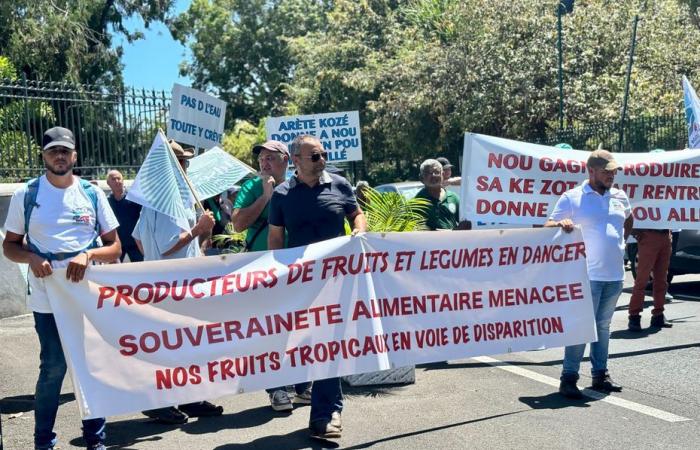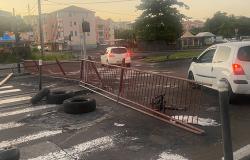
Reunion fruit and vegetable producers demonstrate in front of the prefecture, then the departmental council in Saint-Denis, this Thursday, November 14. They are asking the State and the Department for more resources and taking into account local specificities.
Published on November 14, 2024 at 10:55 a.m.
They are angry. Farmers, more precisely fruit and vegetable producers, in Reunion Island are mobilizing this Thursday, November 14. They gathered in front of the prefecture in Saint-Denis at 9 a.m. to warn of the difficulties in the sector, and of the challenge of food sovereignty about to be lost, according to them.
A procession of around a hundred people then joined the departmental council at the Palais de La Source. In the absence of President Cyrille Melchior, a delegation of 15 representatives was received by Bruno Robert, the former president of Young Farmers, now elected to the Department.
•
©Nina Santi
A delegation was first received this morning at the prefecture. She delivered a motion to the state to “ ask for support for the fruit and vegetable sector and in particular the Victoria pineapple identity sector “.
The producers explain that they undergo ” the impacts of climate change, increased regulatory constraints and a lack of institutional support “. Also, they pull the ” alarm bell “, “ their activity, essential to the island's food sovereignty, is in danger “.
Producers and agricultural unions ask the Department ” the implementation of emergency measures to ensure the continuity and development of fruit and vegetable production in Reunion without discouraging future generations from the interest of strong and profitable agriculture “.
In Reunion, the total production of fruits and vegetables is around 100,000 tonnes per year. The sector generates 40% of the value of the territory, and is the least financially supported by public and European funds, indicate the producers. They note that Reunion ” has the highest coverage rate of fresh fruit and vegetables (70%) of all the Overseas Territories and mainland France “, yet the sector is going badly.
Since 2020, it has been subject to a ” succession of serious difficulties: inflation in the cost of inputs, crop losses linked to climatic hazards, increase in field thefts, difficulty recruiting agricultural labor, inflation in the cost of agricultural labor, changes in standards phytosanitary products, changing consumer expectations “.
“ We're going into a wall “, estimates Gaël Dijoux, farmer in Bellevue, in the Hauts de Sainte-Suzanne. “ There, the producer is dying “, he warns
For me, we are doing what France is doing, that is to say we are taking a march on food sovereignty. And we can clearly see that it is import that wins.
Gaël Dijoux, fruit and vegetable producer in Sainte-Suzanne
“If we don’t have the means to produce properly, we will never be competitive “, says Gaël Dijoux. For him, we need to review the regulatory standards for Reunion. A French and European country of course, but also a tropical outermost region, he says. The farmer therefore demands tools adapted to the Reunion climate.
We must also give ourselves the means to produce, in particular with suitable seeds and therefore the necessary authorizations, explains Gaël Dijoux. Supporting the department in diversification is essential, as is the provision of cisterns for irrigation.
He grows fruit and vegetables on 6 hectares, tomatoes, sweet potatoes, cassava and even pineapples. He expects awareness from the State and ” a strong commitment from the Department “. Gaël Rivière calls for support from fruit and vegetable producers.
Water supply to farms and freezing of progressive pricing, adaptation of standards with solutions for the phytosanitary control of crops, or even support for plant diversification, particularly for signature crops such as the Victoria pineapple, are expected by the profession.
” We can clearly see today that the agricultural world is in clear decline “, and ” warning signal ” which must be heard according to Gaël Dijoux. An agricultural world mobilized at the national level this Thursday, November 14, moreover, several calls for action were launched.





